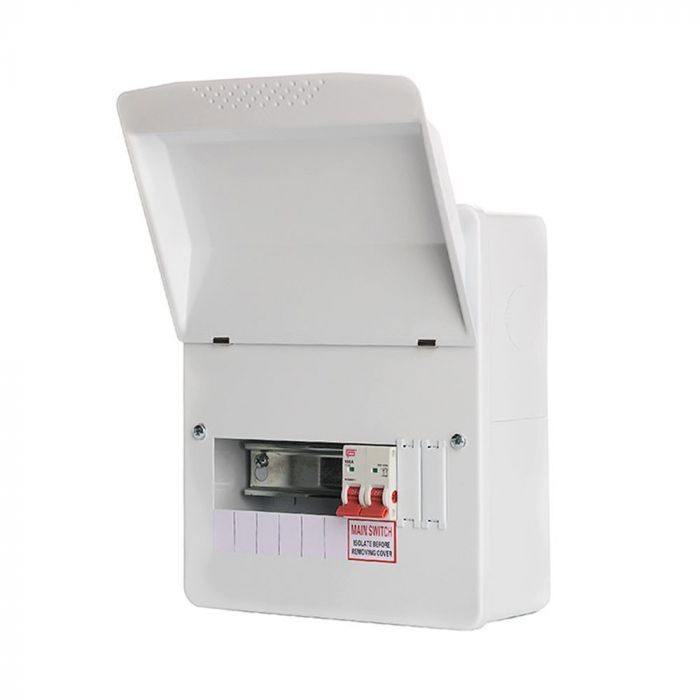The Duty of Consumer Systems in Reliable Energy Management Solution
Customer systems are important to effective energy management systems, serving as the primary circulation factors for electrical power within frameworks. The introduction of wise modern technologies has actually additionally improved their functionality, allowing for real-time information surveillance and nuanced power consumption analysis.
Comprehending Customer Devices

Recognizing the duty of customer systems begins with acknowledging their essential function in securing electrical systems. By isolating faults within details circuits, customer units avoid prevalent outages and prospective fire threats. This seclusion is accomplished with the use of circuit breakers that journey or merges that blow when a mistake is spotted, thereby removing the electric circulation to the affected circuit.
Furthermore, customer devices assist in the orderly distribution of power, boosting the efficiency of power usage. They permit the methodical monitoring of electric tons, which can be particularly important in commercial and industrial settings where demand can fluctuate substantially. Appropriately kept consumer devices add to the long life of electric systems and help in reducing downtime triggered by electric failings, eventually sustaining the seamless operation of energy-dependent centers.
Smart Technologies Combination

An essential advantage of wise customer devices is their ability to take advantage of progressed formulas and artificial intelligence for anticipating analytics. This enables preemptive adjustments based upon use patterns, weather report, and other variables, substantially raising overall effectiveness. Clever customer systems facilitate need feedback programs, where power usage can be dynamically adjusted during top periods to support the grid and reduce expenses.
The combination of renewable energy sources, such as solar and wind, is likewise structured with wise customer devices. By wisely taking care of the intermittency of these sources, these devices guarantee a well balanced and dependable power supply. Additionally, smart consumer units improve individual involvement by giving in-depth understandings and remote control capabilities via mobile applications, cultivating a more proactive approach to energy preservation and sustainability.
Monitoring Energy Consumption
Building on the capabilities of clever technologies assimilation, checking energy intake ends up being a critical emphasis within energy management systems. Efficient tracking works as the foundation for recognizing power inadequacies and implementing restorative procedures. By leveraging advanced metering framework (AMI), real-time data on energy usage can be accumulated at granular degrees, supplying important insights into intake patterns and peak demand durations. This data-centric technique allows both view it consumers and energy managers to make informed decisions targeted at lowering waste and boosting total performance.
Smart meters and Net of Things (IoT) gadgets play a pivotal duty in this monitoring procedure. These devices can track power usage in real-time, transferring information to central systems for evaluation. The accumulated data is then refined via sophisticated algorithms to find abnormalities, forecast future usage, and recommend optimization approaches. Furthermore, cloud-based solutions offer scalable systems for storing and analyzing big datasets, helping with remote tracking and control.
The assimilation of these technologies not only empowers consumers with thorough information concerning their energy usage yet also supports utility service providers in handling load distribution better. Eventually, continuous and exact tracking is essential for achieving energy performance, cost savings, and sustainability objectives within energy administration systems.
Optimizing Home Appliance Use

One effective method includes identifying peak and off-peak hours to change energy-intensive activities, such as washing or dishwashing, to times when power demand is lower. This not just lessens pressure on the grid however likewise exploits on reduced power tolls. In addition, integrating equipment understanding algorithms permits anticipating maintenance, guaranteeing home appliances operate at optimal efficiency and lengthening their lifespan.
Power monitoring systems can also integrate user-specific choices and habits to customize appliance usage timetables. Wise lights systems can change brightness based on tenancy and all-natural light accessibility, while Heating and cooling systems can maintain comfort degrees without excessive energy usage.
Supporting Sustainability
Promoting sustainability within energy monitoring systems entails not only enhancing performance yet additionally fostering eco responsible techniques. Consumer systems are important to this process, as they supply real-time information and check my blog control mechanisms that make it possible for users to check and lower their energy usage. By leveraging sophisticated innovations, customer devices can determine energy-saving opportunities and assist in the integration of eco-friendly power resources like solar and wind power.
One important aspect of advertising sustainability is educating consumers on the advantages of responsible power use. With comprehensive insights provided by consumer systems, individuals can make informed choices that lessen their carbon footprint. These systems can recommend ideal times for running high-energy devices based on grid need and sustainable energy accessibility, thereby reducing dependence on fossil fuels.
Moreover, consumer systems sustain the fostering of wise grid modern technologies, which enhance the overall performance and reliability of power circulation. By making it possible for two-way interaction in between consumers and utility carriers, these systems can dynamically adjust to energy demands, lowering waste and promoting the usage of lasting energy techniques.
Final Thought
Consumer devices, as integral elements of energy management systems, substantially enhance electric safety and security and effectiveness within buildings with circuit defense and clever modern technology integration. Real-time data surveillance and evaluation helped with by these systems maximize power consumption and home appliance usage. Additionally, the consolidation of renewable power sources advertises sustainable practices, adding to minimized overall energy intake and reduced carbon footprints. Customer units play a critical function in progressing both power performance and ecological sustainability.
Advancements in smart technologies have actually changed the abilities of power monitoring systems, especially through the assimilation of clever customer devices.Structure on the capabilities of wise modern technologies integration, monitoring power usage becomes a critical web focus within power monitoring systems.Efficient home appliance use optimization is a crucial component of power administration systems, intending to enhance effectiveness and minimize unneeded power intake.Customer devices, as essential components of power monitoring systems, substantially improve electric safety and efficiency within buildings through circuit protection and clever modern technology integration. Furthermore, the unification of renewable energy sources promotes lasting techniques, adding to decreased overall energy intake and lower carbon impacts.